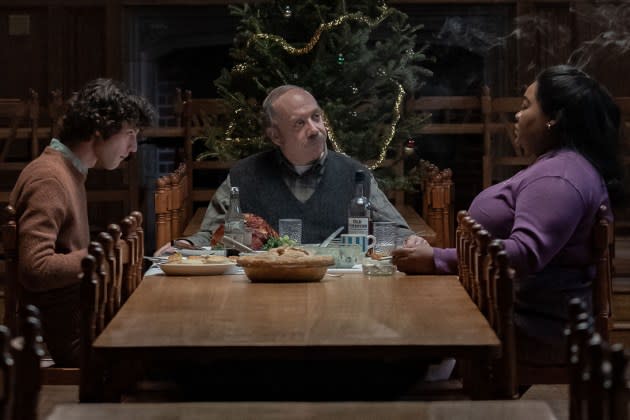‘The Holdovers’ Review: Alexander Payne and Paul Giamatti Reunite for an Imperfect but Rewarding Campus Dramedy
- Oops!Something went wrong.Please try again later.
- Oops!Something went wrong.Please try again later.

It has been six years since Alexander Payne directed his last film, Downsizing, so to watch his new movie is something of an event. The Holdovers — which Focus Features will release later this fall — marks Payne’s reunion with Paul Giamatti, the star of Sideways, and once again the two spark each other in a rewarding way. This new movie is not without its flaws, but it is an engaging and often touching comic drama that builds power as it moves toward its immensely satisfying conclusion.
David Hemingson (best known for writing TV series like Kitchen Confidential) has crafted an incisive screenplay for Payne. The time is Christmas of 1970, and the setting is a hidebound New England prep school preparing for the holidays. Giamatti plays Paul Hunham, a curmudgeonly classics instructor who wins the unenviable job of staying at school over the holidays to look after the boys who are for various reasons unable to return home for the break. Most of the boys despise him, and he has no more fondness for them, but they all settle in for what promises to be a dyspeptic Christmas season.
More from The Hollywood Reporter
A surprise intervention by one of the rich kid’s fathers soon leads to the evacuation of most of the holdover boys. Only one remains: Angus Tully (newcomer Dominic Sessa), whose mother and stepfather are completely out of reach and unable to give their son permission to leave school with the other boys. So he is forced to co-exist with Hunham and the school cook, vividly played by Da‘Vine Joy Randolph. She has her own painful history: Her son (one of the only Black students at the school) was killed in Vietnam after graduating. Yet she has a more positive attitude than either Hunham or Tully, and provides a bit of sensible sustenance for the two of them.
From then on, Hunham and Tully have a series of misadventures, including an injury for Tully, a Christmas party held by another of the school employees (well played by Carrie Preston), a rather grim Christmas dinner in the school cafeteria, and then a surprise getaway to Boston, where both Hunham and Tully have traumatic encounters that create a closer bond between them.
The early scenes of the film are sometimes raucously funny and sometimes repetitive, but the movie picks up considerable momentum in its final third. Both teacher and student discover secrets about the other that prove traumatic and therapeutic at the same time. When they return to school and vacation comes to an end, Tully’s mother and stepfather turn up and threaten to withdraw Tully and send him to a military school. It falls to Hunham to come to the rescue and get emotionally involved with someone else, a burden he has resisted for decades.
Anyone who has followed Payne’s career knows that he is unlikely to succumb to sentimentality. The bittersweet conclusion has just the right note of pathos, which is never oversold or underlined. But the possibility that people might be able to change and learn from each other is rendered here quite forcefully.
Performances could hardly be improved upon. Those of us who got tired of watching Billions after too many years of repetitive cutthroat competitiveness will be thrilled to rediscover Giamatti on the big screen. The role of the cranky academic could easily be a stock character, but Giamatti invests the role with bilious wit as well as a few fleeting glimpses of vulnerability. It is difficult not to share Hunham’s disdain for his pretentious faculty colleagues and spoiled students, but we gradually come to realize the disappointments that underlie his cynicism.
Sessa is a remarkably gifted newcomer who, like Giamatti, never begs for audience sympathy. He highlights the arrogance and belligerence of the character while also convincing us that there is a gifted young man beneath the swagger. Randolph has a somewhat smaller role, but whenever she is on screen, her toughness as well as her sadness register forcefully.
This also happens to be a beautifully crafted film, with elegant cinematography of the wintry landscapes and musty institutions. Cinematographer Eigil Bryld and production designer Ryan Warren Smith bring time and place vividly to life. Payne may overdo the use of Christmas classics on the soundtrack, but this is the only failing in terms of the film’s technical credits. The picture meanders a bit and could probably use a tighter editing hand, but the emotion that it builds at the end is deftly understated and all the more devastating as a result.
Best of The Hollywood Reporter
Kim Cattrall and Five Actors Who Made Surprising Returns to a Role
10 Times Hollywood Predicted the Scary (or Not So Scary) Future of AI
21 Actors Who Committed to Method Acting at Some Point in Their Career

